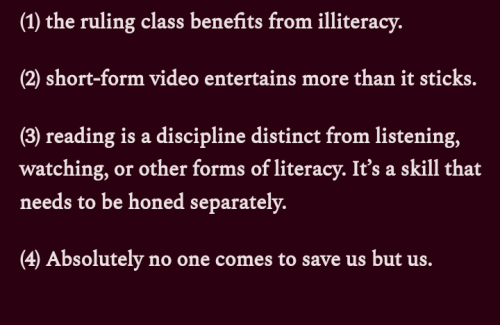Tips On Making The Writing Process Easier
Tips on Making the Writing Process Easier
Use sticky notes to write down and organize major plot points
When inspiration for an idea strikes, write it down every single time. You never know if you might need that idea, and if you don’t write it, you will forget it.
Write the dialogue first. That way, you have a set up for a scene, but don’t have to focus too hard on narration.
Write your story by scene by scene. This way, you can focus on a scene at a time instead of an entire story. This does not mean you should stop focusing on writing a story
Remember to eat and drink
When you get stuck, stir up some conflicts.
Get The Emotion Thesaurus by Angela Ackerman and Becca Puglisi. It’s a guide for nearly every emotion you can write
Use a notebook and write by hand. I know it sounds awful (and for some, it might be awful) but writing with a pen and paper is drastically different than writing on a laptop, and this can make it so much easier
Remember to have a social life. Friends are important for your well-being (and possibly your wip)
Your outline is there to guide you through your story. But if your story disagrees with your outline, derail from the outline and come back to it when/if you get back on track
If you don’t get back on track, either continue with the story and hope you don’t get stuck, or tweak your outline
That’s it for now. Follow me for more writing tips and advice
More Posts from Sparklingsilvermagnolias and Others
art will save you, being unreasonably passionate about something niche will save you, letting past sources of joy show you the way back to yourself will save you, earnestness over composure will save you, the natural world will save you, caring for something bigger than yourself will save you, daring to be seen will save you, kindness not as a whim but a principle will save you, appreciation as a practice will save you, daring to try something new will save you, grounding will save you, love will save you, one good nights sleep will save you
Vibes for Softly Tortured Characters
For the ones who make you want to wrap them in a blanket and also scream “JUST TALK TO SOMEONE.”
Always looks like they didn’t sleep (because they didn’t)
Talks like they’re about to say something else, but never does
Constantly touches their sleeves/jewelry/lip, like if they’re not holding something, they’ll fall apart
Laughs too easily, but it never quite reaches their eyes
Over-apologizes for things no one noticed
Craves affection but flinches when they get it
Body language = trying to take up as little space as possible
Flashes of unexpected rage, like pressure finally cracking glass
Always says “I’m fine” in a tone that screams “Please ask again”
Cries alone, then wipes their face like it’s a secret
Feels safest in chaos because stillness feels like waiting for pain
Thinks being loved means being a burden
Cannot remember the last time they were truly, fully relaxed
Keeps people at arm’s length, but is the first to drop everything if someone else needs help
Treats their own joy like it's a luxury they didn’t earn
Do you have any tips for how to slow down time in a story?
How to slow down time
To slow down time in your story you need to use a mix of different writing ingredients: you need different descriptions that capture the reader in the moment as well as internal monologue and different sentence structures.
Detailed Descriptions:
Sensory Details: Use the five senses—sight, sound, smell, taste, and touch to describe what the character is seeing, hearing, feeling, smelling, and tasting in intricate detail.
Detailed Observations: Zoom in on small, often overlooked details. The sound a tea cup makes as it hits the ground, the way an expression on a character's face changes, the turning of heads as someone enters the room.
Slow Motion: Manipulate the time by describing how it feels like slow motion to the characters: "Time slowed down, and it felt as if the whole of humanity had decided to stop breathing for a moment."
Physical Reactions: A detailed description of the physical aspects of a scene. The movements a character makes, how their gaze turns, their breathing changes, their body begins to shake.
Psychological Aspects: Focus on the anxiety of a character looking at a clock that never seems to move, their nervousness seeping out of them
Internal Monologue:
Memories and Flashbacks: Add context by showing memories or flashbacks that relate to the situation.
Pondering: Let the character reflect on the situation, their feelings and their plan for the next steps. Let the reader explore the character's inner life.
Dialogue:
Reduced Dialogue: Dialogue brings a scene into real time. Use it thoughtfully and sparringly, with lots of inner thoughts and reactions in between.
Silence: Make use of silence between the characters which can be filled with more descriptions.
Language:
Smaller Steps: Write out each action taken, no matter how small, and focus on describing each step that happens.
Control Pacing: Use your sentence structure to create long descriptions that slow it down, and short, impactful ones to pick up the pace if needed for a moment.
More: Masterpost: How to write a story
- Jana
GUIDE: NAMING A TOWN OR CITY
This post was originally from a FAQ, but since the original link is now defunct, I am re-posting it here.
There are many things to keep in mind when naming the town or city in your novel:
1) Genre/Theme/Tone
It’s very important to consider the genre and theme of your story when choosing a town name. Take these names for example, each of which indicates the genre or theme of the story: King’s Landing (sounds fantastical) Cloud City (sounds futuristic) Silent Hill (sounds scary) Sweet Valley (sounds happy and upbeat) Bikini Bottom (sounds funny) Radiator Springs (sounds car-related) Halloween Town (sounds Halloween-related) Storybrooke (sounds fairytale-related) 2) Time/Place It’s also important to consider the time and place where your story takes place. For example, you wouldn’t use “Vista Gulch” as a name for a town in Victorian England. You probably wouldn’t use it for a town in modern day North Carolina, either. Vista is a Spanish word and would normally be found in places where Spanish names are common, like Spain, Central and South America, the southwest United States (including southern California), Cuba, Puerto Rico, Dominican Republic, and Florida. 3) Size/Settlement Type An isolated town of 300 people probably won’t be Valley City, but a sprawling metropolis of 30 million could be called Windyville, because it could have started out as a small town and grew into a large city. 4) Geography Words like gulch, butte,and bayou tend to be regional terms. You probably wouldn’t find Berle’s Bayou in Idaho, or Windy Butte in Rhode Island. Words like mount, cape, and valley are dependent upon terrain. Most of the time, you won’t have a town named “mount” something unless there are hills or mountains nearby. You wouldn’t use “cape” unless the town was on a cape, which requires a large body of water. 5) History Is there a historical person or event that your town might be named after? The Simpsons’ hometown of Springfield is ironically named after its founder, Jebediah Springfield. Chattanooga, Tennessee is named after the Cherokee town that was there first. Nargothrond, in The Lord of the Rings, is an Elvish town with an Elvish name. 6) Combination of Words
person name + geographical term = Smithfield, Smith Creek
group name + geographical term = Pioneer Valley, Settlers’ Ridge
descriptive word + geographical term = Mystic Falls, Smoky Hill
person name + settlement type = Smithton, Claraville
landmark + settlement type = Bridgton, Beaconville
Word Lists
Types of Settlements

Geographical Features
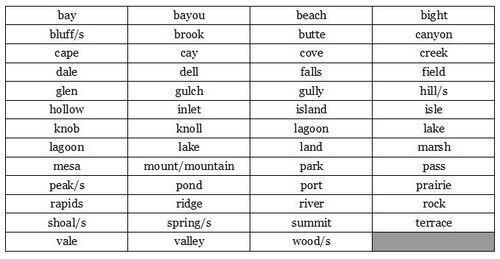
Place Words

Common Suffixes
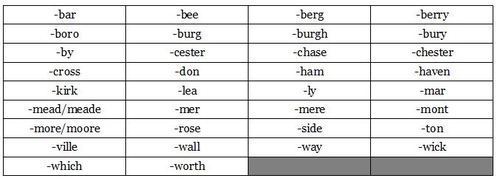
Other Descriptors
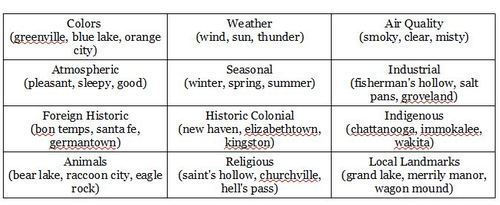
Hey, look at me. Look at me. I’ve said it once and I’ll say it again: you need to condition yourself to being okay with being inconvenienced by things. The first time I spoke about this I meant it in a mental health way- it is good to go out to the store and see people versus just ordering alone at home- but there is another more pressing societal issue you should be more concerned about as well.
Any service you rely on for convenience can be weaponized against you the moment you begin to rely on it. Streaming used to be a cheap and convenient way to see movies at home. It is now exorbitantly expensive, you need multiple accounts just to get what you want, and any of those movies can be taken from you at any time. And unless you have gotten used to going through the “inconvenience” of owning physical media, you can do nothing about it. Same goes for buying things on Amazon. Same goes for any service like DoorDash etc. These companies WANT you to be reliant on them for convenience so they can do whatever they want to you because, well, what else are you gonna do?
Same thing goes for the uptick in AI. If you train yourself to become reliant on AI for doing basic things, you will be taken advantage of. It is only a matter of a couple years before there are no free AI services. Not only that, but in the usage of AI’s case, it is robbing you of valuable skills that you need to curate that you will be helpless without the moment the AI companies drive in the knife the way they have done with streaming. Delivery. Cable. Internet. Etc. It will happen to AI too. And if you are not practicing skills such as. Writing. You are not only going to be at the mercy of AI companies in the digital world, but you are going to be extremely easy to take advantage of in real life too.
I am begging you to let go of learned helplessness. I am begging you to stop letting these companies TEACH you helplessness. Do something like learn to pirate. It is way more inconvenient at the beginning, but once you know how, it is one less way companies can take advantage of you. Garden. Go to the thrift store (older clothes hold up better anyway). These things take more time and effort, yes, but using time and effort are muscles you need to stretch to keep yourself from being flattened under the weight of our capitalist hellscape.
Inconvenience yourself. Please. Start with only the ways you are able. Do a little bit at a time. But do something.
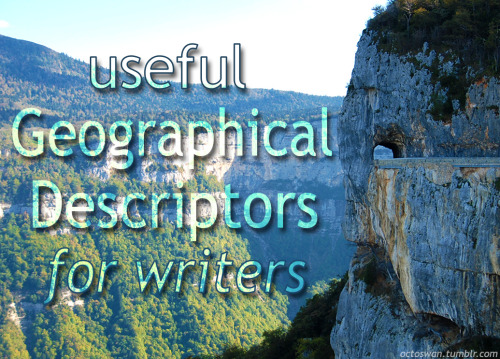


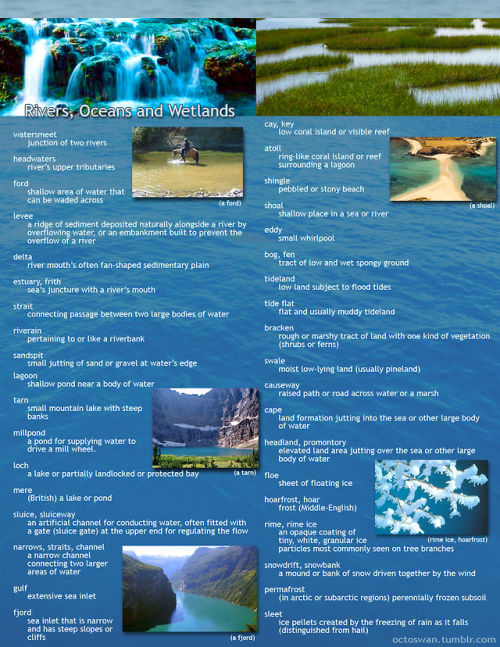
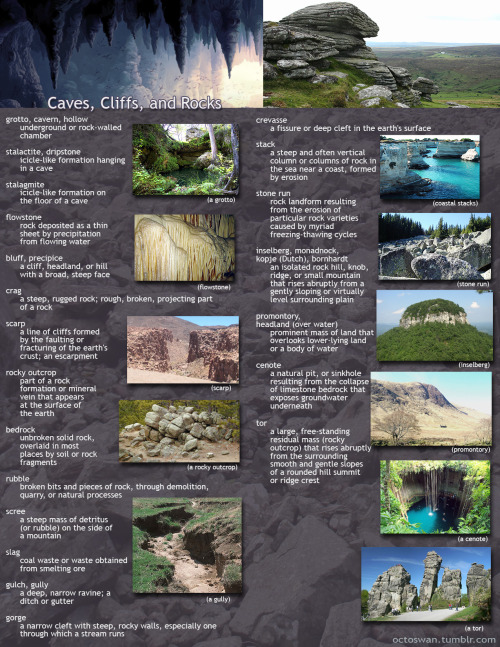
I made these as a way to compile all the geographical vocabulary that I thought was useful and interesting for writers. Some descriptors share categories, and some are simplified, but for the most part everything is in its proper place. Not all the words are as useable as others, and some might take tricky wording to pull off, but I hope these prove useful to all you writers out there!
(save the images to zoom in on the pics)
my 10 holy grail pieces of writing advice for beginners
from an indie author who's published 4 books and written 20+, as well as 400k in fanfiction (who is also a professional beta reader who encounters the same issues in my clients' books over and over)
show don't tell is every bit as important as they say it is, no matter how sick you are of hearing about it. "the floor shifted beneath her feet" hits harder than "she felt sick with shock."
no head hopping. if you want to change pov mid scene, put a scene break. you can change it multiple times in the same scene! just put a break so your readers know you've changed pov.
if you have to infodump, do it through dialogue instead of exposition. your reader will feel like they're learning alongside the character, and it will flow naturally into your story.
never open your book with an exposition dump. instead, your opening scene should drop into the heart of the action with little to no context. raise questions to the reader and sprinkle in the answers bit by bit. let your reader discover the context slowly instead of holding their hand from the start. trust your reader; donn't overexplain the details. this is how you create a perfect hook.
every chapter should end on a cliffhanger. doesn't have to be major, can be as simple as ending a chapter mid conversation and picking it up immediately on the next one. tease your reader and make them need to turn the page.
every scene should subvert the character's expectations, as big as a plot twist or as small as a conversation having a surprising outcome. scenes that meet the character's expectations, such as a boring supply run, should be summarized.
arrive late and leave early to every scene. if you're character's at a party, open with them mid conversation instead of describing how they got dressed, left their house, arrived at the party, (because those things don't subvert their expectations). and when you're done with the reason for the scene is there, i.e. an important conversation, end it. once you've shown what you needed to show, get out, instead of describing your character commuting home (because it doesn't subvert expectations!)
epithets are the devil. "the blond man smiled--" you've lost me. use their name. use it often. don't be afraid of it. the reader won't get tired of it. it will serve you far better than epithets, especially if you have two people of the same pronouns interacting.
your character should always be working towards a goal, internal or external (i.e learning to love themself/killing the villain.) try to establish that goal as soon as possible in the reader's mind. the goal can change, the goal can evolve. as long as the reader knows the character isn't floating aimlessly through the world around them with no agency and no desire. that gets boring fast.
plan scenes that you know you'll have fun writing, instead of scenes that might seem cool in your head but you know you'll loathe every second of. besides the fact that your top priority in writing should be writing for only yourself and having fun, if you're just dragging through a scene you really hate, the scene will suffer for it, and readers can tell. the scenes i get the most praise on are always the scenes i had the most fun writing. an ideal outline shouldn't have parts that make you groan to look at. you'll thank yourself later.
happy writing :)
-
 sparklingsilvermagnolias reblogged this · 1 week ago
sparklingsilvermagnolias reblogged this · 1 week ago -
 gaysexcoach liked this · 1 month ago
gaysexcoach liked this · 1 month ago -
 messyposts reblogged this · 1 month ago
messyposts reblogged this · 1 month ago -
 bylure reblogged this · 1 month ago
bylure reblogged this · 1 month ago -
 bylure liked this · 1 month ago
bylure liked this · 1 month ago -
 sirstanleyvt liked this · 2 months ago
sirstanleyvt liked this · 2 months ago -
 resurrecho liked this · 2 months ago
resurrecho liked this · 2 months ago -
 deliciousbagelbatpainter liked this · 2 months ago
deliciousbagelbatpainter liked this · 2 months ago -
 loudobjectdaze liked this · 2 months ago
loudobjectdaze liked this · 2 months ago -
 4o4art liked this · 2 months ago
4o4art liked this · 2 months ago -
 deepestkittensandwich liked this · 2 months ago
deepestkittensandwich liked this · 2 months ago -
 writeblrwithfangs reblogged this · 2 months ago
writeblrwithfangs reblogged this · 2 months ago -
 adorable-bookworm liked this · 2 months ago
adorable-bookworm liked this · 2 months ago -
 annbourbon liked this · 2 months ago
annbourbon liked this · 2 months ago -
 mimsky reblogged this · 2 months ago
mimsky reblogged this · 2 months ago -
 mimsky liked this · 2 months ago
mimsky liked this · 2 months ago -
 parshalltoliteracy-blog liked this · 2 months ago
parshalltoliteracy-blog liked this · 2 months ago -
 mariposaperfection0826 liked this · 2 months ago
mariposaperfection0826 liked this · 2 months ago -
 gernni liked this · 3 months ago
gernni liked this · 3 months ago -
 readwithnishi liked this · 3 months ago
readwithnishi liked this · 3 months ago -
 starbowhearts reblogged this · 3 months ago
starbowhearts reblogged this · 3 months ago -
 starbowhearts liked this · 3 months ago
starbowhearts liked this · 3 months ago -
 chickpeaprophet reblogged this · 3 months ago
chickpeaprophet reblogged this · 3 months ago -
 chickpeaprophet liked this · 3 months ago
chickpeaprophet liked this · 3 months ago -
 birdsthough liked this · 3 months ago
birdsthough liked this · 3 months ago -
 catadillo liked this · 3 months ago
catadillo liked this · 3 months ago -
 hessethsarestrath liked this · 3 months ago
hessethsarestrath liked this · 3 months ago -
 astrunaria liked this · 3 months ago
astrunaria liked this · 3 months ago -
 known-secret liked this · 3 months ago
known-secret liked this · 3 months ago -
 technicallycaprisun liked this · 3 months ago
technicallycaprisun liked this · 3 months ago -
 thew1zzywiz liked this · 3 months ago
thew1zzywiz liked this · 3 months ago -
 josshi1117 liked this · 3 months ago
josshi1117 liked this · 3 months ago -
 bookswithnolover liked this · 3 months ago
bookswithnolover liked this · 3 months ago -
 personal-writing-dump reblogged this · 3 months ago
personal-writing-dump reblogged this · 3 months ago -
 mylifeisbadpoetry liked this · 3 months ago
mylifeisbadpoetry liked this · 3 months ago -
 egondalatz reblogged this · 3 months ago
egondalatz reblogged this · 3 months ago -
 egondalatz liked this · 3 months ago
egondalatz liked this · 3 months ago -
 keithadlawan reblogged this · 3 months ago
keithadlawan reblogged this · 3 months ago -
 keithadlawan liked this · 3 months ago
keithadlawan liked this · 3 months ago -
 cranberry-queen reblogged this · 3 months ago
cranberry-queen reblogged this · 3 months ago -
 cranberry-queen liked this · 3 months ago
cranberry-queen liked this · 3 months ago -
 chr-chateau-holck liked this · 3 months ago
chr-chateau-holck liked this · 3 months ago -
 justsomesapphicwriter liked this · 3 months ago
justsomesapphicwriter liked this · 3 months ago -
 crazyhalfalien liked this · 3 months ago
crazyhalfalien liked this · 3 months ago -
 crimewriter13 liked this · 3 months ago
crimewriter13 liked this · 3 months ago -
 plumedepegase reblogged this · 3 months ago
plumedepegase reblogged this · 3 months ago -
 messy-writer liked this · 3 months ago
messy-writer liked this · 3 months ago

119 posts

